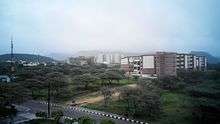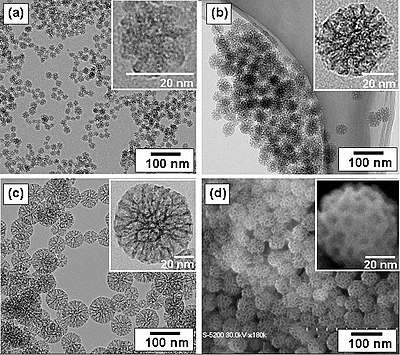Ashok M. Raichur
Ashok M. Raichur is an Indian materials scientist, nanotechnologist and a professor at the Department of Materials Engineering of the Indian Institute of Science. Known for his studies on the use of nanotechnology for biomedical and environmental applications, Raichur is a former Alexander von Humboldt Fellow and a life member of the National Academy of Sciences, India. The Department of Biotechnology of the Government of India awarded him the National Bioscience Award for Career Development, one of the highest Indian science awards, for his contributions to biosciences, in 2009.
Ashok M. Raichur | |
|---|---|
| Born | 8 April 1966 India |
| Nationality | Indian |
| Alma mater | |
| Known for | Studies on nanostructured capsules |
| Awards |
|
| Scientific career | |
| Fields |
|
| Institutions | |
Biography

Ashok Raichur graduated in engineering from Malaviya Regional Engineering College in 1990 and moved to the US for his post-graduate studies at the University of Kentucky from where he earned an MS in 1992.[1] His doctoral studies were at the University of Nevada, Reno and after securing a PhD in 1996, he worked at the same institution for his post-doctoral work as a research associate.[2] On his return to India in 1997, he joined the Indian Institute of Science (IISc) as an assistant professor at the department of materials engineering in 1997 where he holds the position of a professor since 2009, while serving as an associate faculty of the Bioengineering Program as well as the Interdisciplinary Centre for Water Research (ICWaR) of IISc.[3] In between, he served the IISc as an associate professor from 2003 to 2009, as an associate faculty of the Materials Research Center during 2007–10 and as the associate chairman of the Center for Scientific and Industrial Consultancy from 2006 to 2011. He is also a Professor Extraordinarius at the University of South Africa[4] and a former visiting professor at the University of Johannesburg (2012–14).[1][5]
Legacy

Raichur's research focus is on the various biomedical and environmental applications of nanotechnology and he leads a group of scientists at IISc who are involved in the development of polyelectrolyte capsules for gene and drug delivery and nanostructured multilayers for sensing applications, nanoparticle synthesis and their dispersions with the help of biosurfactants.[6] In 2014, he led the team that developed a nanocapsule made of biopolymers which was capable of delivering drugs at specific target sites, such as cancer cells.[7] The drug delivery system developed by them was composed of a drug molecule that resisted premature release or degradation and released the drug at target site with the help of local physiological cues.[8] It was reported that the capsule walls had a cross-linked layer by layer assembly which enabled it to hold large quantities of drugs.[9] He has also developed a catalytic method for cleaning water using nanoparticles which destroyed the organic contaminants in the water.[5] His studies have been documented by way of a number of articles[10][note 1] and ResearchGate, an online repository of scientific articles has listed 158 of them.[4] Besides, he has contributed chapters to books edited by others[11] and has mentored many research scholars in their post-graduate, doctoral and post-doctoral studies.[12][13][14]
Raichur is a member of the PI Committee of the National Programme on Technology Enhance Learning (NPTEL), an educational project funded by the Ministry of Human Resource Development of the Government of India.[15] He is a life member of the National Academy of Sciences, India,[16] the Association of Separation Scientists and Technologists (ASSET)[17] as well as the Materials Research Society of India[18] and has delivered several invited speeches which include the International Conference on Membranes: Environmental and Biological Applications held at the Centre for Environment Education and Technology, Kottayam in 2011[19] and the International Conference on Nanoscience and Technology (ICONSAT 2016), held at the Indian Institute of Science Education and Research, Pune.[20]
Awards and honors
Raichur received the Biotech Process Development and Commercialization Award of the Department of Biotechnology in 2003,[1] the same year as he received the National Metallurgists Day Award of the Ministry of Steel and Mines of the Government of India.[21] He held Alexander von Homboldt Fellowship during 2004–05 and was selected for the Prof. Satish Dhawan Young Engineers Award by the Government of Karnataka in 2005.[22][23] Two years later, he received the 2007 MRSI Medal of the Materials Research Society of India.[24] The Department of Biotechnology (DBT) of the Government of India awarded him the National Bioscience Award for Career Development, one of the highest Indian science awards in 2009.[25]
Selected bibliography
Chapters
- Mamadou S. Diallo; Neil A. Fromer; Myung S. Jhon (16 April 2014). Nanotechnology for Sustainable Development. Springer Science & Business. pp. 89–. ISBN 978-3-319-05041-6.
Articles
- Radhakrishnan, Krishna; Tripathy, Jasaswini; Datey, Akshay; Chakravortty, Dipshikha; Raichur, Ashok M. (5 March 2015). "Mesoporous silica–chondroitin sulphate hybrid nanoparticles for targeted and bio-responsive drug delivery" (PDF). New Journal of Chemistry. 39 (3): 1754–1760. doi:10.1039/c4nj01430h. ISSN 1369-9261.
- Raichur, Ashok; Thomas; Radhakrishnan; Gnanadhas; Chakravortty, Dipshikha (11 January 2013). "Intracellular delivery of doxorubicin encapsulated in novel pH-responsive chitosan/heparin nanocapsules". International Journal of Nanomedicine. 8 (1): 267. doi:10.2147/ijn.s37737. PMC 3548417.
- Anandhakumar, S.; Vijayalakshmi, S. P.; Jagadeesh, G.; Raichur, Ashok M. (28 September 2011). "Silver Nanoparticle Synthesis: Novel Route for Laser Triggering of Polyelectrolyte Capsules". ACS Applied Materials & Interfaces. 3 (9): 3419–3424. doi:10.1021/am200651t. ISSN 1944-8244. PMID 21861501.
See also
Notes
- Please see Selected bibliography section
References
- "Faculty profile". materials.iisc.ernet.in. 20 January 2018. Retrieved 20 January 2018.
- "Biography on Controlled Release Society Indian Chapter" (PDF). 20 January 2018. Archived from the original (PDF) on 21 January 2018. Retrieved 20 January 2018.
- "Faculty – Interdisciplinary Centre for Water Research (ICWaR)". www.icwar.iisc.ernet.in. 20 January 2018. Retrieved 20 January 2018.
- "On ResearchGate". On ResearchGate. 20 January 2018. Retrieved 20 January 2018.
- "Visiting professor establishes new water treatment methods at UJ Institute for Nanotechnology and Water". University of Johannesburg News. Retrieved 20 January 2018.
- "RESEARCH GROUP OF ASHOK M. RAICHUR". materials.iisc.ernet.in. 20 January 2018. Retrieved 20 January 2018.
- "Nanocapsules: IISc develops system to deliver drugs to cancer-affected cells". The Financial Express. Retrieved 20 January 2018.
- "System to deliver drugs to individual cells developed". The Economic Times. 8 October 2014. Retrieved 20 January 2018.
- PTI (8 October 2014). "IISc develops system to deliver drugs to individual cells". The Hindu Business Line. Retrieved 20 January 2018.
- "On Google Scholar". Google Scholar. 20 January 2018. Retrieved 20 January 2018.
- Mamadou S. Diallo; Neil A. Fromer; Myung S. Jhon (16 April 2014). Nanotechnology for Sustainable Development. Springer Science & Business. pp. 89–. ISBN 978-3-319-05041-6.
- "Past group members". materials.iisc.ernet.in. 20 January 2018. Archived from the original on 6 September 2017. Retrieved 20 January 2018.
- "PhD Colloquium: Ms. Sreeranjini P - Materials Engineering". materials.iisc.ac.in. Retrieved 20 January 2018.
- "PhD Defence: Ms. Krishna Radhakrishnan - Materials Engineering". materials.iisc.ac.in. Retrieved 20 January 2018.
- "PI Committee of NPTEL" (PDF). NPTEL. 20 January 2018. Retrieved 20 January 2018.
- "The National Academy of Sciences, India - Life Members". www.nasi.org.in. Retrieved 20 January 2018.
- "Asset Life Members". www.asset.org.in. 20 January 2018. Retrieved 20 January 2018.
- "MRSI Newsletter" (PDF). Materials Research Society of India. 20 January 2018. Retrieved 20 January 2018.
- "International Conference on Membranes: Environmental and Biological Applications". www.ceetindia.org. Retrieved 20 January 2018.
- "International Conference on Nanoscience and Technology (ICONSAT 2016)". www.iiserpune.ac.in. 20 January 2018. Retrieved 20 January 2018.
- "NMD Awards" (PDF). Indian Institute of Metals. 20 January 2018. Retrieved 20 January 2018.
- "KSCST : State Awards - 2004 & 2005". www.kscst.org.in. Retrieved 20 January 2018.
- "Basic sciences to get a boost". icast.org.in. 20 January 2018. Retrieved 20 January 2018.
- "MRSI Awards and Honours". Materials Research Society of India. 20 January 2018. Retrieved 20 January 2018.
- "Awardees of National Bioscience Awards for Career Development" (PDF). Department of Biotechnology. 2016. Retrieved 20 November 2017.
External links
- G. V. Rao, Vibhuti N. Misra (2004). Mineral Processing Technology. Allied Publishers. pp. 121–. ISBN 978-81-7764-599-6.
- "CRS Worldwide - Speakers". www.crsic.org. 20 January 2018. Archived from the original on 21 January 2018. Retrieved 20 January 2018.